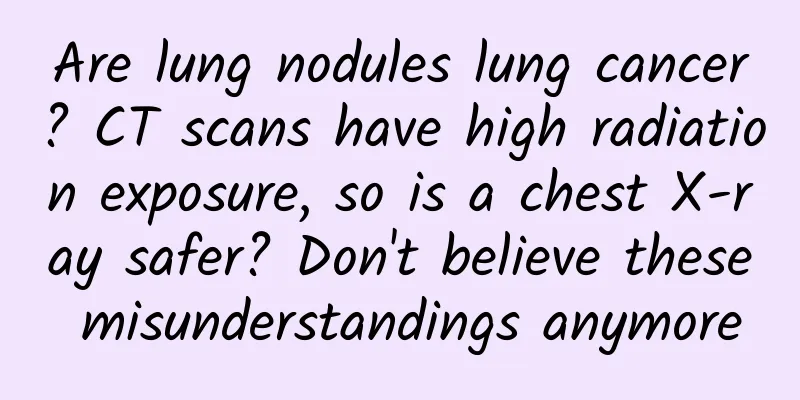Are lung nodules lung cancer? CT scans have high radiation exposure, so is a chest X-ray safer? Don't believe these misunderstandings anymore

|
Lung cancer is one of the leading causes of cancer death worldwide. It not only seriously affects the quality of life of patients, but also brings heavy blows to countless families due to its high mortality rate. Lung cancer often has no obvious symptoms in the early stages, and once discovered, it is usually in the late stages, which makes it particularly important to raise public awareness of the importance of early screening for lung cancer. November of each year is designated as "International Lung Cancer Awareness Month" to better popularize lung cancer knowledge. Copyrighted stock images, no reproduction is authorized Nowadays, everyone has a basic understanding of the harm of lung cancer, but there are also many misunderstandings about lung cancer on the Internet, such as CT radiation is greater than chest X-ray? Physical examination shows that lung nodules are lung cancer? These misunderstandings not only increase everyone's anxiety, but may also lead to wrong decisions. The theme of the 2024 International Lung Cancer Awareness Month is "Pay attention to early screening of lung cancer and standardize the diagnosis and treatment of lung nodules." Let's learn about the misunderstandings about lung cancer screening and lung nodules. For lung cancer screening, is CT worse than chest X-ray? When it comes to chest CT or X-ray examinations, many people will think of radiation! So it often happens that when a doctor finds something suspicious during an examination and recommends a chest CT scan, someone will ask in confusion: "I don't have a cough or chest pain, why do I need a CT scan? And there is radiation?" The doctors are not just looking for trouble. The clinical manifestations of lung cancer are diverse. There are usually no symptoms or the symptoms are not obvious in the early stages. 75% of patients have already developed advanced lung cancer at the time of initial diagnosis. Early lung cancer can only be discovered during chest CT scans or screening of high-risk populations. As for those friends who are afraid of radiation, they can rest assured. In fact, the radiation dose that the human body receives in a normal natural environment is 3~4mSv per year; the radiation dose of a chest X-ray is 0.2~1.2mSv, and the radiation dose of an ordinary spiral CT scan of the chest is 3~5mSv, which is equivalent to being exposed to the natural environment for 1 year. Of course, not everyone needs to do a CT scan to check for lung cancer. In addition to situations where doctors require it, the following groups of people are recommended to undergo lung cancer screening: The Chinese Medical Association's Guidelines for Clinical Diagnosis and Treatment of Lung Cancer (2023 Edition) recommends lung cancer screening for people aged ≥45 years with one of the following risk factors: Cumulative smoking index ≥20 pack-years; History of secondhand smoke or environmental fume inhalation; History of exposure to occupational carcinogens: such as long-term exposure to radon, arsenic, beryllium, chromium, cadmium and its compounds, asbestos, silica and soot; those with a history of malignant tumors; Family history of lung cancer in first- and second-degree relatives. Conclusion: Low-dose CT scan is recommended as the first choice for screening of early lung cancer in high-risk populations. Occasionally doing a CT scan during routine physical examinations and medical examinations will not harm the body. Women who are preparing for pregnancy, pregnant, or breastfeeding should inform their doctors before the examination, and pregnant women should avoid CT examinations. Does lung nodule equal lung cancer? With the advancement of medical imaging technology and the improvement of the public's health awareness, more and more people will find that they have "lung nodules" during routine physical examinations. Many friends who have lung nodules will be anxious: "Doctor, is this cancer? Do I need surgery to remove it?" Specialists will tell you that many lung nodules are actually the marks left by the years and the marks of old changes in the lungs. If you see "lung nodules" during your first chest CT scan, don't be too nervous or worried. More than 95% of lung nodules are benign and do not necessarily require clinical intervention, let alone immediate surgical removal. How do doctors determine whether a nodule may become cancerous? Pulmonary nodules are manifested as lung shadows with a diameter of ≤3 cm on imaging. Pulmonary nodules can be divided into three categories according to their density: Pure ground glass nodules (PGGN), solid nodules and part-solid nodules (PSN). Among them, ground glass nodules look like frosted glass on the film, with clear boundaries, and are mostly benign. However, once ground glass nodules become malignant, they are prone to develop lung adenocarcinoma, which is more common in women. Mixed nodules have more solid components than pure ground glass nodules. This type of nodule is the most dangerous, with a malignancy rate of more than 60%. When describing nodules, malignant nodules often have these words in imaging: lobulation, spicules, blood vessels, cavitation, pleural indentation, etc. And when the word "calcification" is seen, the possibility of benign is greater. From the perspective of the possibility of malignant transformation, solid nodules are less than pure ground glass nodules and less than mixed ground glass nodules. Especially for patients with older age, larger nodule diameter, and more high-risk risk factors, the probability of malignant transformation is relatively high. However, I would like to emphasize that what I have said before is only to help you understand lung nodules and reduce unnecessary anxiety, not to make you feel more and more like you have lung cancer after looking at the test results. We just need to remember that most lung nodules are benign. If there are suspicious signs, the doctor will arrange for further examinations or pay attention to changes in the nodules during the next physical examination. Is lung cancer contagious and hereditary? In life, we may find that lung cancer is concentrated among family members, such as "husband and wife cancer", "father and son cancer", and "brother cancer". Could it be that lung cancer can also be contagious? This statement is of course incorrect. Infectious diseases require three conditions: a source of infection, a route of transmission, and a susceptible population. None of these three conditions can be missing. The emergence of cancer is due to the influence of carcinogenic factors, genetic genes, and other reasons, which cause the cells in the patient's body to mutate. Although lung cancer itself is not contagious, there are many clinical cases of family clustering and couples suffering from cancer. In particular, if there is a lung cancer patient among the parents or other direct relatives, the possibility of their relatives suffering from lung cancer will also increase. This is mainly related to genetic genes, common living environment (such as people often smoking indoors), eating habits, etc., but it is not caused by infection. Copyrighted stock images, no reproduction is authorized In summary, cancer is not contagious, and cancer patients are not a source of infection. Lung cancer is not like some single-gene genetic diseases, which are directly inherited from parents to children. However, some lung cancers have "susceptibility genes" for lung cancer, and with the addition of other risk factors, they are more likely to get the disease than ordinary people. If a direct relative in the family is diagnosed with lung cancer, the risk of lung cancer will increase to a certain extent. To prevent lung cancer, do the following 7 things? There are many risk factors for lung cancer, so we need to pay attention to many aspects of our lives. Here are a few: 1. You must quit smoking. The key to preventing lung cancer is to stay away from tobacco, including secondhand smoke, and the best time to quit smoking is "now"; 2. Occupational protection. People with a history of occupational exposure to carcinogens should take good labor protection measures; 3. Stay away from pollution. Try to avoid indoor air pollution, keep ventilation, avoid excessive decoration, do not use open flames to heat, and control the oil temperature when cooking to reduce the generation of oil smoke. When air pollution is serious, try to reduce outdoor activities and wear a protective mask; 4. Healthy diet. Develop good eating habits. Eat more fresh fruits and vegetables in your daily diet, and try not to eat smoked, grilled, or moldy food; 5. Exercise regularly. Keep exercising regularly and keep a happy mood; 6. Treat chronic diseases. Provide timely and standardized treatment for respiratory diseases such as chronic obstructive pulmonary disease or diffuse pulmonary fibrosis; 7. Regular physical examinations. People at high risk of lung cancer should undergo low-dose spiral CT screening once a year. Follow-up of lung nodules is recommended to be closely followed up in the same hospital. Author: Hu Zhongdong, Healthy China Action Spokesperson, Associate Chief Physician, Registered Nutritionist, Health Manager Review | Pan Zhanhe, Chief Physician, Master Supervisor, Department of Oncology, Zhongshan Hospital, Xiamen University |
>>: Not too big, not too small, why is the human body size just right?
Recommend
In the new era, what kind of learning ability do we need?
Bacon once said: Knowledge is power. However, onl...
Marketing promotion: Why is product promotion ineffective?
When users are faced with product marketing that ...
What is Web Hosting? What are the advantages and disadvantages of shared hosting?
After the website is completed, where should it b...
Android crashes and pops up system messages, netizens provide temporary solutions
[[407114]] Recently, many Android users have enco...
Baidu Information Flow Platform Advertising Construction Process Guide
This article will tell you about the process of b...
What kind of rubber band is this that can achieve great results with just a little effort?
Produced by: Science Popularization China Author:...
If you learn physics well, you can make the most delicious fried rice...right?
When I was a child, my deskmate Xiaohua asked me:...
Is it true that crying can eliminate toxins from the body?
gossip "Shedding tears can expel toxins from...
In the first year of 5G, what kind of mobile phone evolution war has Huawei Mate30 started?
On September 19, 2019, Huawei officially released...
Why is Ant Technology’s valuation so high? The basis for Ant Technology’s $200 billion valuation
On July 20, Alipay’s parent company Ant Technolog...
How much does it cost to rent a server with high-defense DDOS IP?
How much does it cost to rent a server with high-...
How to design new product invitation activities to promote products themselves (Part 1)
This article is a summary of the results of a use...
Miaopai's rankings from January to June reveal four major trends in the short video industry
From January to now, the entire short video indus...
Qifen Academy "Sister-in-law's Emotional Intelligence Class"
Qifen Academy "Sister-in-law's Emotional...
Will the surge in international oil prices hit the Chinese auto market hard?
When filling up a tank of gas costs more than 20 ...









